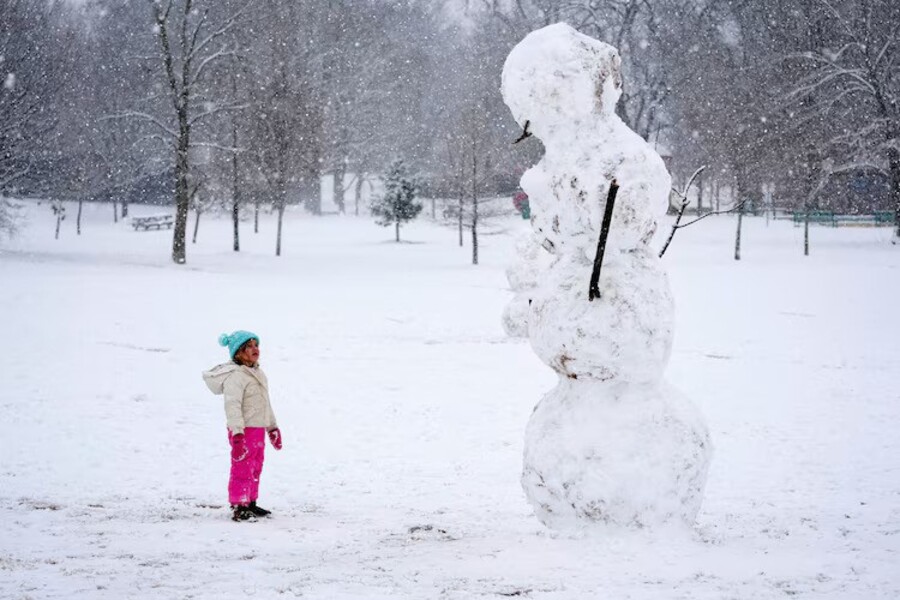A historic winter storm has brought much of the Southern United States to a standstill, leaving millions of residents grappling with record-breaking snowfall, travel disruptions, and dangerous conditions. The rare weather event has shattered decades-old snow records across multiple states, paralyzing cities and challenging communities unaccustomed to such extreme winter weather.
Memphis, Tennessee, recorded 7.5 inches of snow on Friday, the city’s highest single-day snowfall in 40 years and a new daily record. In Atlanta, Georgia, snowfall reached 2.1 inches, the city’s most significant accumulation in seven years. Other areas experienced even more dramatic totals: Arkansas measured up to 14 inches, Oklahoma up to a foot, Texas as much as 10 inches, and northern Alabama around 5 inches. For residents across the region, the unprecedented snowfall transformed landscapes and disrupted daily life.
The storm’s impact on travel has been profound. Major highways in Tennessee, Texas, and other states became treacherous, prompting officials to issue urgent warnings for drivers to stay off the roads. Accidents and stranded vehicles were reported in numerous locations as icy conditions made travel nearly impossible.
Airports were also heavily affected, with Atlanta’s Hartsfield–Jackson International Airport canceling at least 328 flights as of Saturday morning. About 20% of those cancellations were departures, stranding passengers and disrupting travel plans. Airlines struggled to de-ice planes and manage schedules amid the severe weather.
The storm’s reach extended to professional sports, with the NBA postponing Saturday’s game between the Houston Rockets and Atlanta Hawks due to hazardous travel conditions. Such disruptions underscore the widespread impact of the storm, which has left many residents scrambling to adapt.
For much of the South, which rarely sees significant snowfall, the lack of infrastructure to handle winter storms has amplified the challenges. Cities and towns struggled to clear roads and maintain essential services without sufficient snowplows, salt trucks, or other necessary equipment. Power outages added to the difficulties, with heavy snow and ice weighing down power lines and causing widespread blackouts. Utility companies worked around the clock to restore electricity, though some residents were warned of extended outages.
While the immediate threat of snowfall has subsided, the storm’s aftermath continues to pose risks. A blast of Arctic air is forecast to sweep across the region early next week, bringing dangerously low temperatures and sub-zero wind chills. Meteorologists warn that Tuesday through Thursday could see some of the coldest conditions in years, with wind chill advisories likely from North Dakota to the mountains of North Carolina.
“This is the most snow I’ve ever seen here,” said Robert Jones, a Memphis resident. “We’re not equipped for this kind of weather. It’s beautiful, but it’s also brought everything to a halt.”
Local officials have emphasized the need for residents to stay vigilant as the region recovers. Emergency crews are working to clear roads, assist stranded motorists, and restore essential services. Residents have been urged to stay indoors and avoid unnecessary travel until conditions improve.
The storm has also reignited conversations about preparedness for extreme weather events in the South. With climate patterns becoming increasingly unpredictable, experts say investing in infrastructure to handle severe winter conditions is more important than ever. “This storm is a wake-up call,” said Angela Carter, a meteorologist with the National Weather Service. “Communities need to be ready for the unexpected, even in regions where snow is rare.”
As residents dig out from the historic storm, many are reflecting on its unprecedented nature. From shattered snow records to widespread disruptions, the event has left an indelible mark on the South. While the immediate focus remains on recovery, the lessons learned from this storm may help prepare the region for future winter weather challenges.
